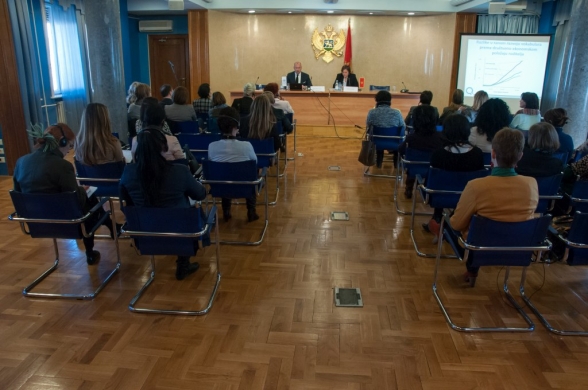Mr Benjamin Perks, Head of UNICEF Office to Montenegro, presented a study, whose compiling was initiated by the Ministry of Education of Montenegro and UNICEF Montenegro. The goal of this study is to develop a scenario for broadening of the scope of preschool education to all children aged 3 until they are of school age, especially children from disadvantaged and marginalised groups.
Analysis of strategic and regulatory framework indicates that the significance of preschool education for child’s development is recognised in Montenegro, as well as that there is a good programme foundation for its broadening. The current scope of children aged 3-6 (who represent the target group of this study) amounts to 52% at the level of Montenegro but it is very varied – in the group of municipalities with a high scope, which are predominantly municipalities of the southern region, it amounts to 88%, while in municipalities with a low scope, which are predominantly municipalities of the northern region, it amounts to only 27%. Many preschool institutions in the southern and central region of Montenegro work over their capacity, with groups that are far larger than the legally prescribed norm.
The purpose of this study is analysis of a scenario for funding preschool education, with special focus on socially excluded and marginalised children. Three basic goals of this study included:
- preparation of a scenario for funding which would enable as broad as possible scope of preschool preparation programme for children who will start school in no later than a year, as well as scenario for gradual growth of scope of children aged 3-5 in the preschool programme, in order to achieve universal coverage; the focus was on marginalised and disadvantaged groups of children;
- provision of recommendations for normative funding models for preschool education services, in order to include the disadvantaged children/families; and
- provision of recommendations for optimisation of use of the existing funds for preschool institutions within the available/planned budget.
The meeting was attended by UNICEF representatives, coordinators for issues of gender equality in state institutions, directors of public preschool institutions and representatives of NGO sector. The attendees pointed out that the subject study had comprehensively shown the situation in the preschool institutions in Montenegro, as well as the scope of children of preschool age covered by this form of education. They pointed out multiple aspects confirming the need for greater involvement of children in preschool education, as well as the problems which we were facing. Primarily, it is necessary to raise awareness of population regarding the compulsory inclusion of children in preschool education by leading comprehensive and continuous campaigns. The existing spatial resources need to be adequately used for compulsory free afternoon scope of children older than 5, as well as the possibility for education of the existing employees and hiring new one. Additionally, it is necessary to provide better chargeability of fees from parents for children staying in kindergarten in the following period, with gradual increase of price for children’s stay, and to enable increase of capacities.
The idea for launching a school for responsible parenting was presented at the meeting. Furthermore, the importance of monitoring gender aspect in the field of early education of children in Montenegro was emphasised.









